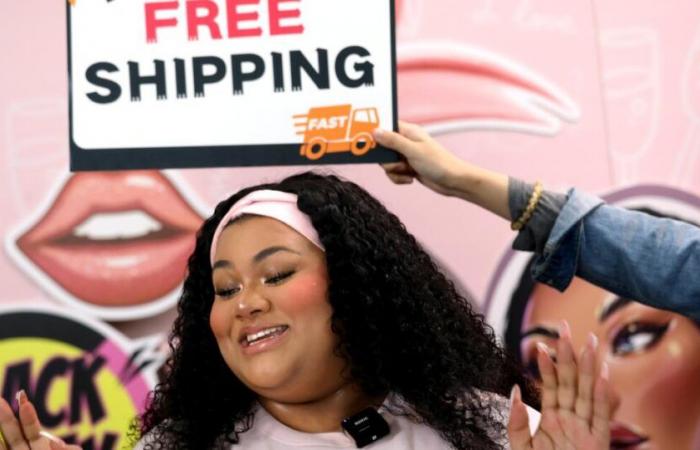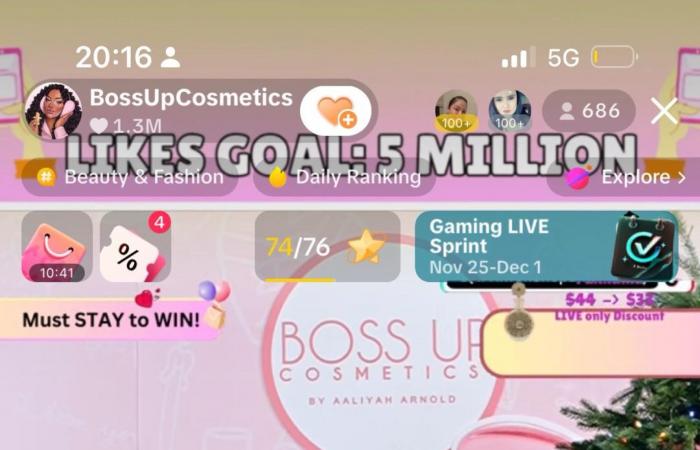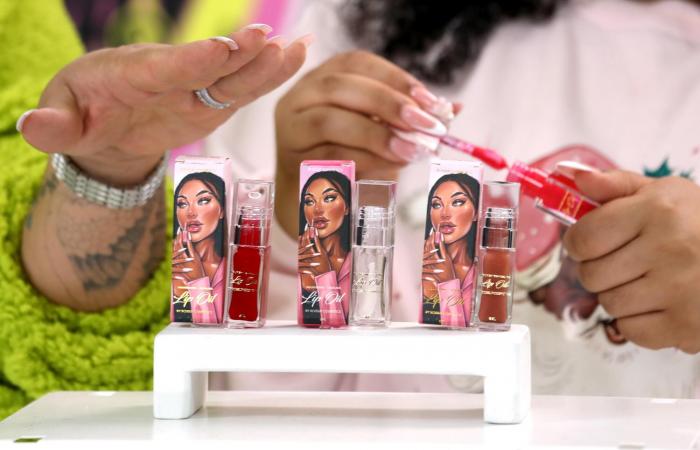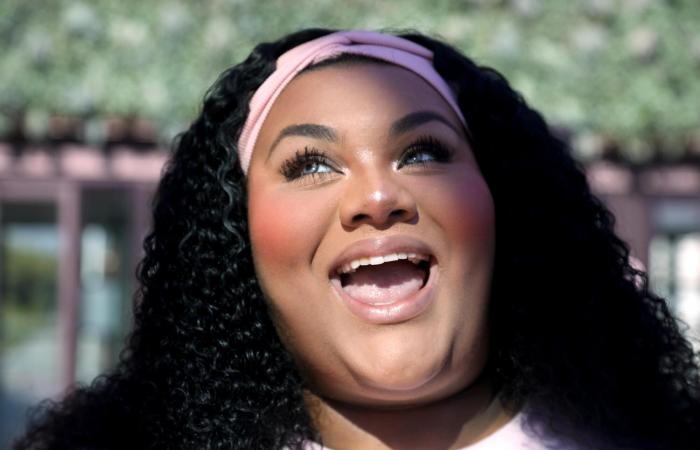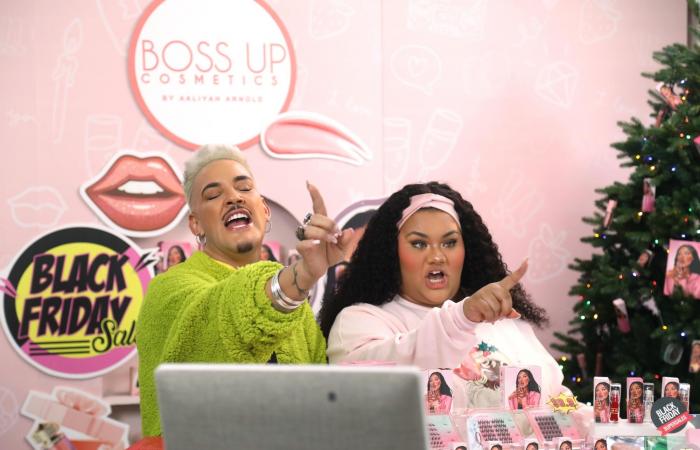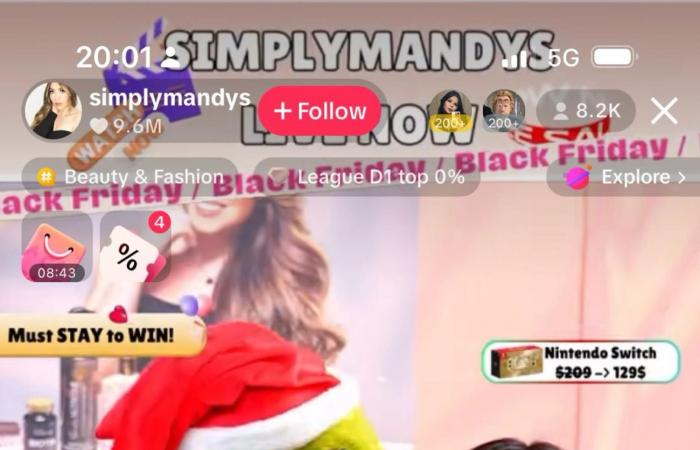It is just past 10 p.m. and Aaliyah Arnold, the 20-year-old founder of BossUp Cosmetics, is selling to the TikTok universe.
As she livestreams from a Culver City filming location, about 750 people around the world watch her announce a flash sale for a mystery box containing six to eight BossUp products. Typically priced at $101.96, the bundle is now 49% off — for the next few minutes only. On viewers’ smartphone screens, a countdown timer and a red “Buy” button appear, along with a flurry of heart emojis.
“Make sure you’re shopping shopping shopping till you can’t shop no more!” Arnold, in a light pink Santa Claus sweatshirt and a full face of glam, says into one of several cameras arranged around her. To the side of the makeshift stage, members of a production crew, fueled by energy drinks and a steady stream of fast-food deliveries, ready the next group of products.
Arnold and co-host Daniel Rene hype heavily discounted BossUp products during a marathon TikTok livestream filmed in Culver City last month.
(Genaro Molina / Los Angeles Times)
Arnold is 10 hours into a marathon selling spree and still has two hours to go. Like a Gen Z version of QVC, TikTok Live shopping events are part of a push by the social media platform to combine the convenience of mobile commerce and the frenzied consumerism of limited-time deals with interactive, unscripted entertainment. By the time her livestream ends at midnight, Arnold will have racked up $70,000 in sales and 10,000 new followers.
TikTok launched TikTok Shop — a feature that enables users to buy directly within the app — in the U.S. last year, and since then small-business owners, celebrities and major retailers have been using the livestreaming function to boost their sales and engage with customers in real time. Brands might use a Live to unveil a line of boots and take questions from viewers on sizing, or to demonstrate how to use a new hairstyling tool or kitchen gadget.
Although anyone with at least 1,000 followers can livestream themselves, TikTok has been reaching out to influential users like Arnold who have large followings and a proven ability to sell and inviting them to be a part of its TikTok Shop Partner program.
In exchange for a cut of the action, the company offers professional services to help sellers turbocharge their businesses. That includes helping them produce, as Arnold described, “huge mega livestreams” — splashy multi-hour events professionally filmed in studios, event spaces and homes around Los Angeles.
A look at how Arnold’s recent TikTok Live shopping event appeared on viewers’ mobile screens around the world. Live selling enables customers to interact with sellers in real time.
(TikTok)
TikTok’s push into the e-commerce market comes amid a backdrop of uncertainty over the company’s future in the country. The app faces a nationwide ban after years of back and forth with the U.S. government over national security concerns; the ban is scheduled to go into effect Jan. 19 unless TikTok’s Chinese parent company, ByteDance, divests its U.S. operations.
Online live selling has been a retail phenomenon for years in China but has been slower to catch on in the U.S., where it accounts for only a tiny fraction of e-commerce revenue. That’s despite the 1990s popularity of television channels like QVC and the Home Shopping Network, and more recent live-shopping efforts by tech companies and retail brands including Amazon. In 2022, Facebook shut down its live-selling feature after two years; Instagram pulled the plug a few months later.
Livestreaming e-commerce was estimated to total $31.7 billion in the U.S. last year, according to Coresight Research.
“This pales in comparison to China’s livestreaming market, which was valued at $512 billion in 2022, revealing the significant growth opportunity in the U.S. market,” the firm said.
With a built-in audience of 170 million American users, many of them extremely online young adults well-versed in shopping on their mobile devicesTikTok is trying to push the watch-and-shop trend into the mainstream.
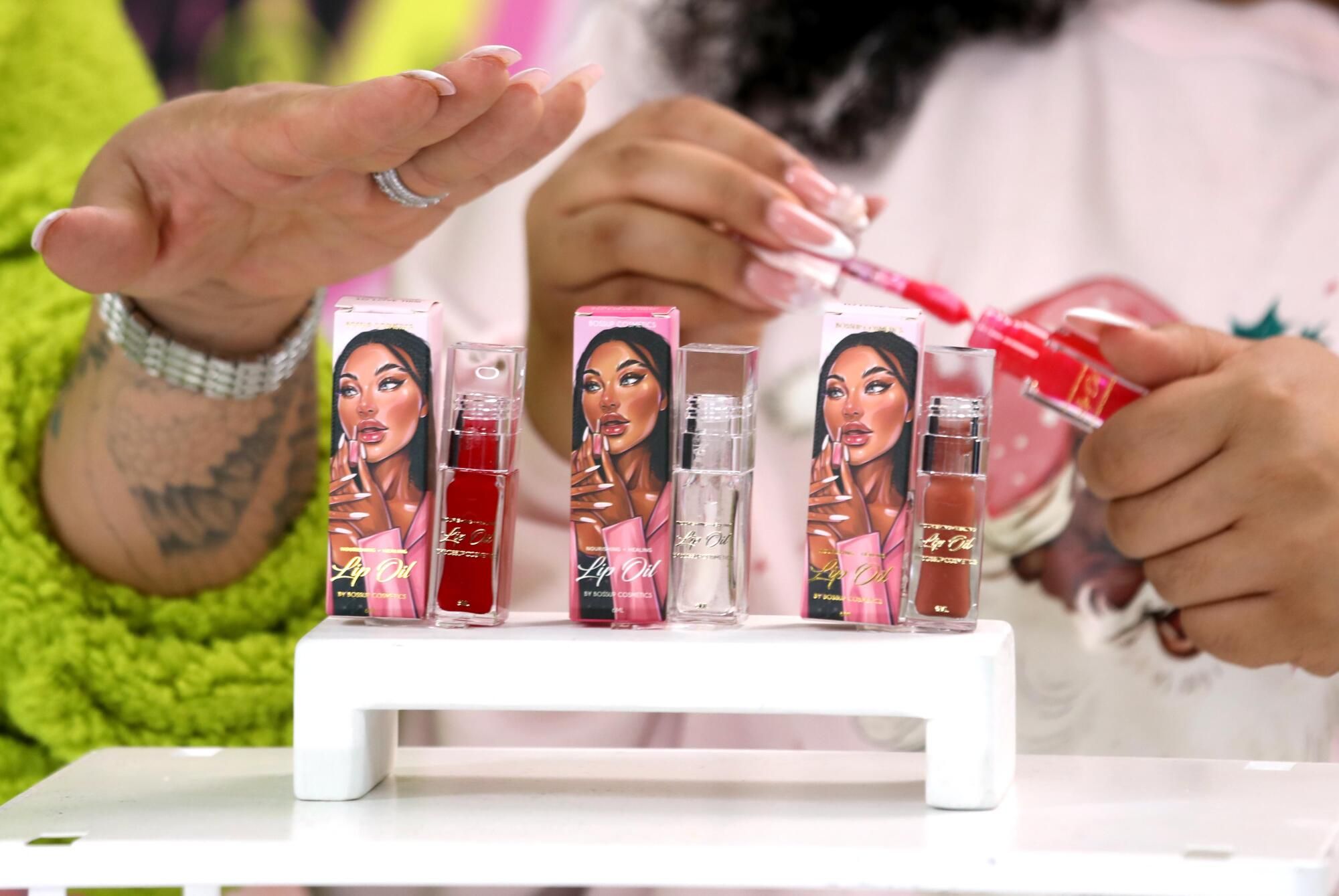
Rene and Arnold demonstrate BossUp’s lip oil to viewers during her livestream.
(Genaro Molina / Los Angeles Times)
Live selling is “redefining the future of shopping on TikTok Shop,” said Nico Le Bourgeois, head of U.S. operations for TikTok Shop. He said the number of Live shopping sessions hosted on the app every month has nearly tripled in the last year.
Longer and higher-quality Lives drive more sales on TikTok Shop; that’s a win for sellers and for the social media company, which takes a 6% cut of sales on the platform, called a referral fee. Le Bourgeois declined to say how much revenue live selling has generated but said the number of people shopping on TikTok Shop every month has nearly tripled since its launch 15 months ago.
When they told me, “Can you do Live for 12 hours?” I was like, “You guys are sick, no.”
— Magdalena Peña, founder of beauty and hair-care brand Simply Mandys
TikTok Lives have become a pillar of brands’ sales strategies for the holiday season, and cheerfully chaotic livestreams are being held around the clock. From Nov. 13 through Dec. 2, nearly half a million Live shopping sessions were hosted on TikTok, for a total of more than 660,000 hours.
On Nov. 24, rapper Nicki Minaj hosted a two-hour livestream for her line of press-on nails that became the highest-viewed TikTok Shop Live ever, with 80,000 viewers simultaneously watching at one point. A few days later, Canvas Beauty Brand founder Stormi Steele surpassed $2 million in sales during her Black Friday livestream, a new record for a single TikTok Live.
The foray into e-commerce marks an evolution for a platform that had been known primarily as a place to endlessly scroll through frothy short-form videos. In short order, the company has shown that it “isn’t just entertainment — it’s a retail accelerator,” Oliver Chen, a retail analyst and Columbia Business School professor, wrote last month.
Arnold started BossUp when she was 14 and joined TikTok a year later in 2019. She would spontaneously host livestreams by broadcasting herself from her iPhone, which grew her fan base and got the word out about her burgeoning cosmetics brand.
But if viewers wanted to buy products, Arnold had to direct them to BossUp’s website because TikTok wasn’t shoppable back then. Many wouldn’t follow through.
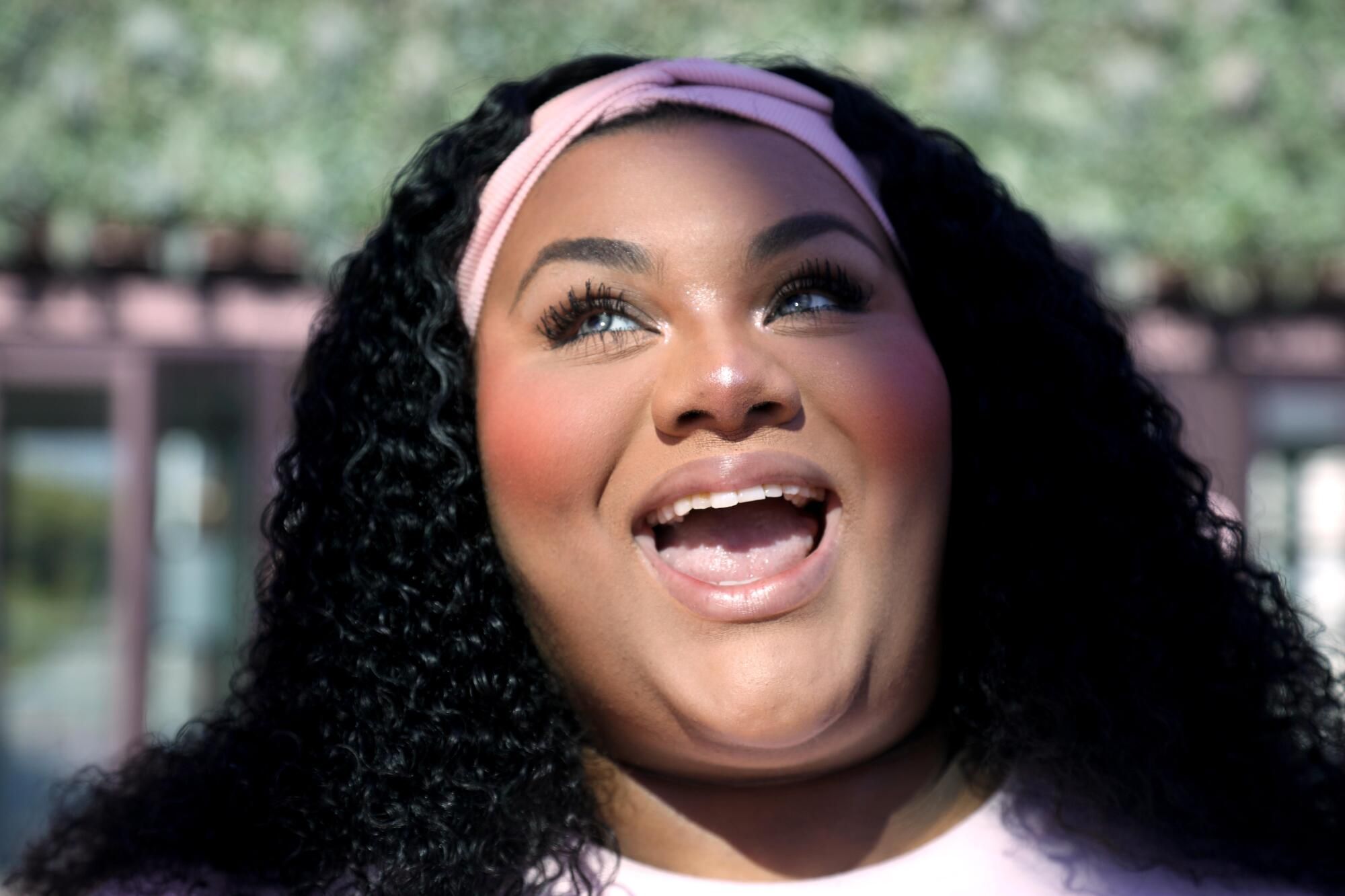
Arnold founded BossUp when she was 14 and joined TikTok a year later. She would casually livestream from her iPhone, which grew her fan base and got the word out about her burgeoning beauty company.
(Genaro Molina / Los Angeles Times)
After the introduction of TikTop Shop in September 2023, BossUp sales swelled and Arnold’s casual livestreams caught the attention of TikTok. The company emailed Arnold with an offer to set her up with a Los Angeles agency called Yowant that specializes in working with online creators.
Arnold now flies from her home near Houston to L.A. every few weeks to host lengthy TikTok Live shopping sessions produced by the agency, which negotiates payment directly with its clients. Yowant provides her with producers and engineers, and assembles a stage with lighting, cameras and large monitors that display questions and comments as soon as viewers type them.
TikTok Shop employees, meanwhile, help her decide on a sales strategy for each Live, planning out the optimal date, a catchy soundtrack, how steep the discounts should be and which third-party affiliate products she should sell alongside her own, for which she receives a commission.
TikTok Shop has built me up like crazy.
— Aaliyah Arnold, founder of BossUp Cosmetics
Right at noon on the day of her Live last month in Culver City, the crew lets out a roar of cheers as the cameras are turned on.
“Deals and sales and giveaways — you don’t want to miss it, join in join in join in!” Arnold shouts over the commotion. “The biggest Live we’ve ever done, it’s starting right now…. Get a drink, get a snack, let’s go!”
“This is so overstimulating,” types one viewer.
Arnold and co-host Daniel Rene kick things off with a flash deal for BossUp’s Color Changing Lip Oil, usually $12.99 but marked down to $5. “Tap tap tap, shop shop shop!” she says before reminding viewers that shipping is free. Orders begin to pour in.
Seconds later a bullhorn blares, signaling the end of the deal, and Arnold is immediately on to the next discount. She does several makeup tutorials during the Live, deftly lining her lips a deep mahogany shade as a cameraman zooms in on her voluminous pout.
“People pay good money for lips like that!” Rene says approvingly.
In an interview with The Times before the livestream began, Arnold said TikTok Shop “has built me up like crazy.” She declined to provide revenue figures, but said that in the 12 months after TikTok Shop was introduced, BossUp sales increased nearly 500% compared with the 12 months prior.
That enabled her to purchase a house in June and bring on family members as employees. She bought a truck for her grandfather and a packaging warehouse for her fast-growing business.
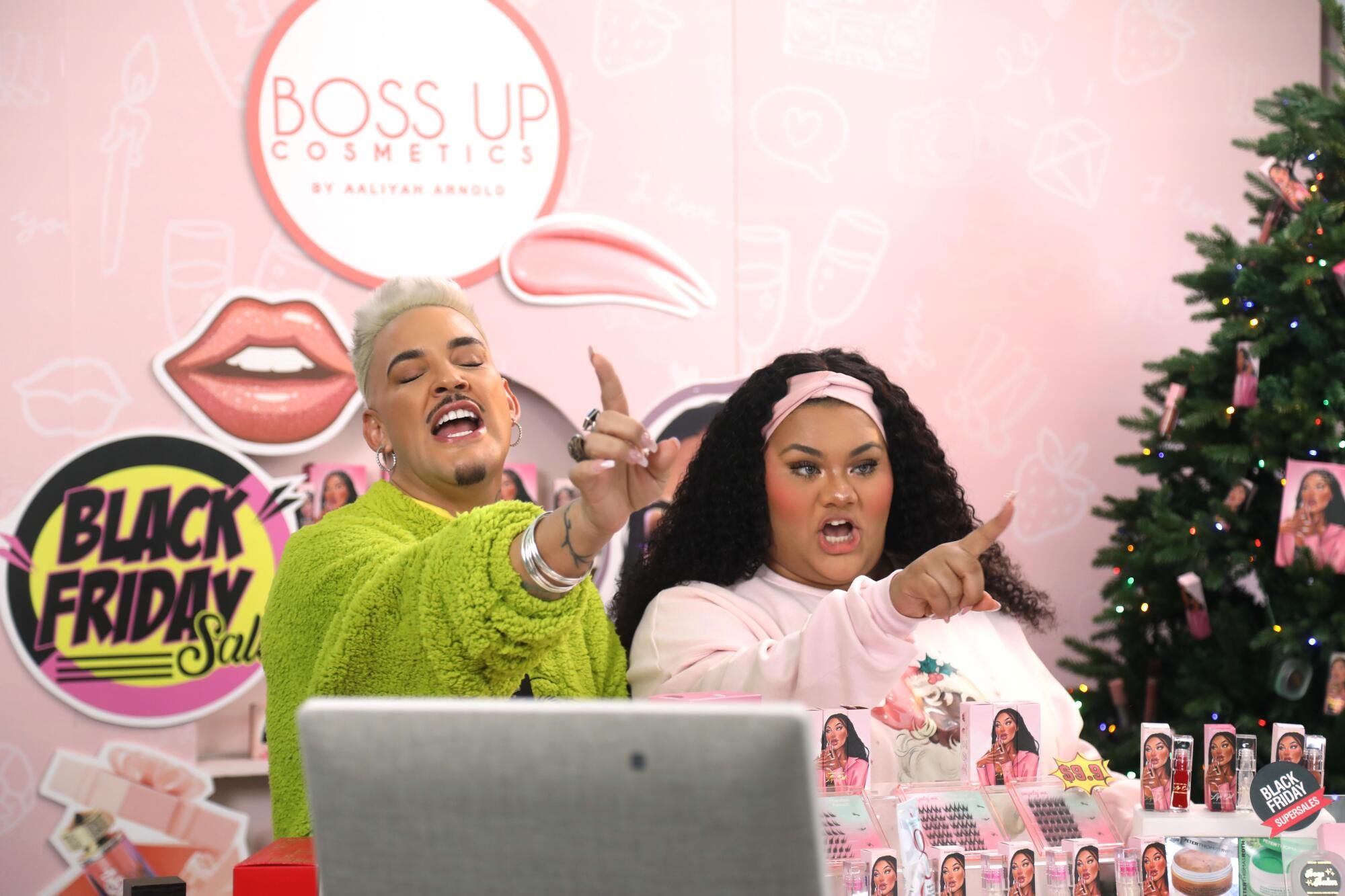
Arnold’s recent TikTok Live in Culver City brought in $70,000 in sales over 12 hours.
(Genaro Molina / Los Angeles Times)
Despite the uncertainty around TikTok’s future, business owners are forging ahead with all-out Live sessions in the weeks leading up to Christmas.
Over six days starting the day before Thanksgiving, Magdalena Peña, the founder of beauty and hair-care brand Simply Mandys, hosted three TikTok Live sessions for a combined 29 hours. The first brought in more than $1 million in sales.
Like Arnold, Peña was approached by employees at TikTok Shop shortly after the e-commerce feature was rolled out.
“When they told me, ‘Can you do Live for 12 hours?’ I was like, ‘You guys are sick, no,’” she recalled. “There’s no way.”
The professional services and other perks that came with TikTok’s support, however, persuaded her to reconsider. The company, for example, offered free advertising and to pay for 30% discounts for first-time buyers.
There were some stipulations: Peña, 37, could no longer include her daughter in her livestreams because she was underage; wasn’t able to showcase products not linked to TikTok Shop; and had to ship orders within two days.
“The better you follow the rules,” she said, “the more TikTok helps you.”
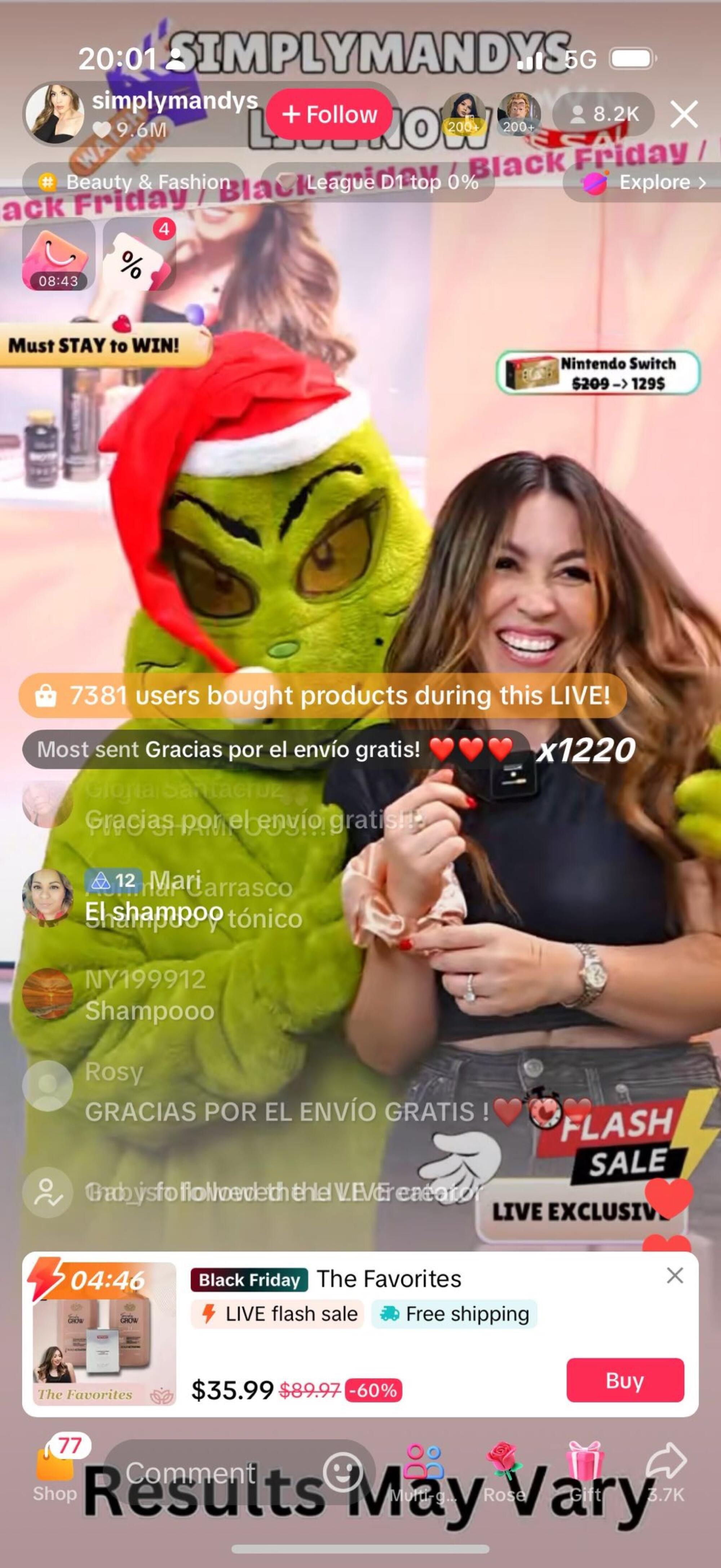
Magdalena Peña, the founder of beauty and hair-care company Simply Mandys, during a TikTok Live last month.
(TikTok)
Since partnering with the company, Peña has filmed TikTok Live shopping sessions in Culver City and West Hollywood. She is responsible for paying her travel costs to the Live sessions, driving with her husband and business partner from their home in Sanger, Calif.
That is, until a few weeks ago, when the couple bought a small plane. Simply Mandys’ revenue this year through November was already quadruple what it was in 2023 — a jump Peña credits to her Live events on TikTok, which she called a “total game-changer.”
She said she is still adjusting to the frequent travel and the long days of filming, finding motivation in the adrenaline rush that comes when she sees the sales figures climb during her Lives.
“I do everything possible to hit the goal,” she said. “I tell my team, ‘I’m not leaving here until I hit that number.’”

